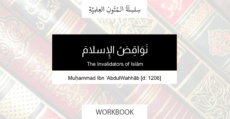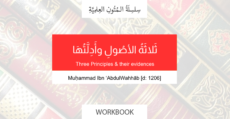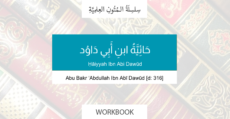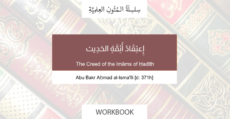A series of lessons in which a brief synopsis, breakdown and benefits of four important texts of Aqeedah are studied. The four texts are:
- Al-Usool Ath-Thalaatha (The Three Fundamental Principles)
- Al-Qawaa’id Al-Arba’ (The Four Fundamental Principles)
- Al-Usool As-Sittah (The Six Fundamental Principles)
- Nawaaqidh Al-Islam (The Invalidators of Islam)
Whilst listening to the lessons below, the following workbook can be downloaded and printed: Download Workbook
Lesson One: In this lesson you will learn: Introduction to the series: What is the meaning of Tawheed? What is the difference between Tawheed and Aqeedah? Reasons why we study Tawheed? The distinction of these four texts. A brief biography of Imaam Muhammad Ibn AbdulWahhab At-Tameemee; A Hadeeth which mentions the virtue of the tribe of Tameem. Download Lesson 1
Lesson Two: [Beginning of the 1st treatise] In this lesson you will learn: A synopsis of the treatise Al-Usool Ath-Thalaatha; The different sections of this treatise; The three questions in the grave; an explanation of Basmalah; The importance of knowledge; Soorat Al-Asr; The statement of Imaam Al-Bukhaaree “knowledge precedes speech and action. Download Lesson 2
Lesson Three: In this lesson you will learn: Three important obligations: Allah created us for a purpose and sent Messengers to show us how to fulfil this purpose; Allah is not pleased with any form of Shirk; from the right of Tawheed is to love and hate for the sake of Allah. Download Lesson 3
Lesson Four: In this lesson you will learn: The meaning of Rabb; The principle: Tawheed Ar-Ruboobiyyah necessitates Tawheed Al-Uloohiyyah; The first command and the first prohibition in the Qur’an. Download Lesson 4
Lesson Five: In this lesson you will learn: An explanation of different types of Worship – Conditions to ask others for help; what is the true meaning of Tawakkul; when is a person permitted to fear others besides Allah; How do we know when an action is ‘Ibaadah (Worship)? Download Lesson 5
Lesson Six: In this lesson you will learn: The meaning of ‘Deen’; The three different levels of our religion; The meaning of the word ‘Islam’; The meaning of Laa ilaaha illa Allah and its two pillars; The meaning of ‘Muhammad Rasoolullah’; What the two testimonies of Islaam necessitate; The importance of Salaah; The five pillars of Islaam. Download Lesson 6
Lesson Seven: In this lesson you will learn: The meaning of ‘Imaan’; What is the shyness which is from Imaan; The correct Imaan in Allah; What entails Imaan in the Angels, Books, Messengers and Final Day; Correct Imaan in the Decree of Allah; Allah has decreed all good and bad; Why evil cannot be attributed to Allah; The wisdom of Allah in allowing evil to take place; the difference between the worship of Awliyaa and the worship of ordinary MuslimsDownload Lesson 7
Lesson Eight: In this lesson you will learn: 30 benefits from the famous Hadeeth of Jibreel (alayhi as-salaam) – when he appeared in front of the Prophet and his Companions in the form of a man.Download Lesson 8
Lesson Nine: In this lesson you will learn: Basic Seerah of the Prophet; The meaning of the name “Muhammad”; the lineage of the Prophet and where the Arabs came from; why the Prophet called himself the “son of the two slaughtered fathers; the story of the first revelation and how he became a Prophet; the core message of his mission. Download Lesson 9
Lesson Ten: In this lesson you will learn: The meaning of Hijrah; The different types of Hijrah; The reason why the Hijrah is legislated; How to differentiate between Dar al-Islam and Dar al-Kufr; When is Hijrah recommended and when is it obligatory. Download Lesson 10
Lesson Eleven [Ending of the 1st treatise]: In this lesson you will learn: Evidences that the Prophet (sal Allaahu alayhi wa sallam died); How the Prophet was washed, prayed over and buried after he died; Who the first Prophet was; The meaning of Taaghoot and their types. Download Lesson 11
Lesson Twelve [Beginning of the 2nd treatise]: In this lesson you will learn: A synopsis and breakdown of the treatise Al-Qawaaid Al-Arba’; The correct belief with regards to the ‘Arsh (throne) of Allah; how Allah protects a person in the Dunya and Akhirah; the meaning and importance of Barakah in our lives; the keys to happiness Download Lesson 12
Lesson Thirteen: In this lesson you will learn: Why Allah created us; What are the conditions for your Ibaadah to be accepted by Allah; What nullifies ‘Ibaadah; The dangers of Shirk. Download Lesson 13
Lesson Fourteen: In this lesson you will learn: Believing Allah is the Creator and Provider is not sufficient to be a Muslim; the correct meaning of ‘Laa ilaaha illa Allah’; Abu Jahl, Abu Lahab and the Polytheists at the time of the Prophet also believed that Allah is the only Creator and Provider. Download Lesson 14
Lesson Fifteen: In this lesson you will learn: The definition of Shafaa’ah and Tawassul, and the difference between them; the type of Tawassul which is legislated and the type of Tawassul which is Bid’ah and Shirk; The Quraysh only worshipped their idols as a form of intercession to Allah; Conditions for Shafaa’ah to be accepted by Allah; We affirm the Shafaa’ah of the Prophet on the Day of Resurrection Download Lesson 15
Lesson Sixteen: [Ending of the 2nd treatise] In this lesson you will learn: Evidences that that the Quraysh worshipped different types of deities including righteous people and prophets; why the Shirk of today is worse than the Shirk of early times; the obligation of removing any avenue to Shirk. Download Lesson 16
Lesson Seventeen: [Beginning of the 3rd treatise] In this lesson you will learn: A synopsis of Al-Usool As-Sittah (The 6 Fundamental Principles); A brief summary and breakdown of the treatise; Download Lesson 17
Lesson Eighteen: In this lesson you will learn: The first principle from Al-Usool As-Sittah; the definition of Ikhlaas; The difference between Ikhlaas and Tawheed; How every Ayah of the Qur’an relates to Tawheed Download Lesson 18
Lesson Nineteen: In this lesson you will learn: The importance of unity in Islam; evidences from the Qur’an and Sunnah regarding unity; Examples from the laws of the Sharee’ah which were legislated to promote unity – including aspects of the Prayer, transactions, marriage, social interactions etc… Download Lesson 19
Lesson Twenty: In this lesson you will learn: The principle of hearing, obeying and accepting the authority of the Muslim rulers, even if they have some corruption and oppression; the prohibition of rebelling against Muslim rulers.
Download Lesson 20
Lesson Twenty One: In this lesson you will learn: The principle of knowledge and scholars; what is knowledge? How can we recognise who the scholars are? What are the characteristics of the scholars? What a person should do if he does not know which scholars to take from; An advice to read Fataawa on a daily basis. Download Lesson 21
Lesson Twenty Two: In this lesson you will learn: The linguistic and Islamic definition of Walee and Wilaayah; Who are the Awliyaa? Aayaat and Ahadeeth which clarify our belief regarding the Awliyaa; How Shirk emanates from exaggerating the Awliyaa; The story of the first instance of Shirk in mankind; Download Lesson 22
Lesson Twenty Three: [End of the 3rd treatise] In this lesson you will learn: A clarification of the doubt utilised by some groups of innovation that the Qur’an and Sunnah can only be understood by a great scholar, not a common Muslim.Download Lesson 23
Lesson Twenty Four: [Beginning of the 4th treatise] In this lesson you will learn: An introduction to the treatise: Nawaaqidh Al-Islam (Invalidators of Islam); Why we study this treatise; The dangers of Takfeer; Some of the Fiqh rulings of Takfeer; The meaning of Nawaaqidh; A Prophetic strategy in teaching and education of enumerating points. Download Lesson 24
Lesson Twenty Five: In this lesson you will learn: The importance of knowing both good and evil (in order to avoid evil); 4 types of people with regards to knowing good and evil (by Ibn Al-Qayyim); A reading of the whole treatise. Download Lesson 25
Lesson Twenty Six: In this lesson you will learn: The 1st matter which invalidates a person’s Islam: Shirk; Its definition, types and levels; Does a good person, who did not accept Tawheed, enter Paradise? Download Lesson 26
Lesson Twenty ٍSeven: In this lesson you will learn: The 2nd matter which invalidates a person’s Islam: Interceders between a person and Allah (Waseelah); Meaning of Waseelah and Shafa’ah; Different types of Shafa’ah; An admonishment to attach your heart to Allah even when you are dependant on others; different types of Tawakkul (reliance); a reply to the doubts of people who commit Shirk in the guise of Waseelah. Download Lesson 27
Lesson Twenty Eight: In this lesson you will learn: The 3rd matter which invalidates a person’s Islam: Whoever does not affirm the disbelief of a Kaafir, or doubts his disbelief or validates their religion; Is it permitted to partake in the funeral service or memorial of a Kaafir? The misguidance of the call to the ‘Unity of religions’; Conditions for a Muslim man marrying a non-Muslim woman; Practical matters based on Takfeer of the Mushrikoon; interactions which are permitted between a Muslim and a Kaafir; Download Lesson 28
Lesson Twenty Nine: In this lesson you will learn: The 4th matter which invalidates a person’s Islam: whoever believes that the laws of Islam are not complete, perfect or relevant; believing that the guidance or laws of others are better or more complete that the laws of Islam; the ruling upon a person who accepts the Qur’an but rejects the Sunnah; when does a person disbelieve when ruling by man-made laws? Download Lesson 29
Lesson Thirty: In this lesson you will learn: A revision of the previous lessons and the 5th matter which invalidates a person’s Islam: whoever hates and detest something which the Prophet came with; The difference between Shirk and a Major sin; regarding a person who accepts the Qur’an but rejects the Sunnah Download Lesson 30
Lesson Thirty One: In this lesson you will learn: The 6th matter which invalidates a person’s Islam: mocking and joking about any aspect of Islam; The severity of joking about Allah, His religion or His Prophet. Download Lesson 31
Lesson Thirty Two: In this lesson you will learn: The 7th matter which invalidates a person’s Islam: magic; The different types of magic; why magic is disbelief; the story of when magic was done upon the Prophet (sal Allaahu alayhi wa sallam); the Islamic punishment on a magician; the ruling of illusions, camera tricks, sleight of hand etc…. Download Lesson 32
Lesson Thirty Three: In this lesson you will learn: The 8th matter which invalidates a person’s Islam: supporting and aiding the Kuffar over the Muslims; when is this disbelief and when it is not; a refutation of the doubts of the extremists such as the Khawaarij; the importance of loving and hating for the sake of Allah; the different types of love and hate. Download Lesson 33
Lesson Thirty Four: In this lesson you will learn: The 9th matter which invalidates a person’s Islam: believing it is permitted for a person to not follow the Sharee’ah of Muhammad; The belief of the extreme Soofis; Was Khidr obligated to follow the Sharee’ah of Prophet Mooosa; What is secularism? Download Lesson 34
Lesson Thirty Five: [End of the 4th treatise] In this lesson you will learn: The 10th matter which invalidates a person’s Islam and principles related to the Nawaaqidh: ‘Completely turning away from learning and acting upon Islam; What is Kufr Al-I’raadh; three groups of people with regards to knowledge and actions; the different levels of knowledge; the ruling of a person who commits Kufr (disbelief) out of fear, and a person who was coerced to say a word or action of Kufr.Download Lesson 35






alhamdulillah
Alhamdulillah indeed Brother.
Asalamu alaykum wa rahmatullah, in the very first lesson, the shaykh mentioned that they’ve gone through the above treaties in detail before, is there any chance these were recorded? Jazakum Allah khayr
Walaykum salaam wa rahmatullahi wa barakaatuh,
Unfortunately there are no other recordings of the more detailed lessons, however we advise with the reading of the scholar’s books such as the explanation of the Shaykh Ibn Uthaymeen for Al-Usool Ath-Thalaatha which is more detailed.
وبالله التوفيق
Assalaamu alaykum
Re: twitter
In lesson 3 you mention the 3rd principle of wala wa al-baraa, that aiding the kufar over the muslims due to worldly reasons, e.g. a reward, bribed, pressured or sanctions.
I was wondering whether this applies to crimes committed? such as, a reward for information that will catch a criminal/criminals that are known to be muslim. I have my own thoughts, but wanted to ensure I understood what you meant by worldly reason.
Walaykum salaam,
The reporting of a criminal whose crimes will harm innocent people is an obligation, it enters into the Hadeeth “Whoever amongst you sees an evil, let him change it with his hand. If he is unable to do so, let him speak against it with his tongue. If he is unable to do so, let him hate it in his heart, and that is the weakest level of Imaan.”
The intent behind “a worldly reason” is matters such as accepting a bribe, property, status, authority etc…
وبالله التوفيق
May Allah reward you.
Can i get any Arabic work book so that i can have Arabic definition to memorise without any mistake.
May Allah bless you and give you success in this life and the Hereafter.
The link for the workbook is available above, in the introductory notes above lesson one.
wa billaahi at-Tawfeeq
jazaakallahu khairan
Assalamu’alaykum,
May Allah grant you Al-Firdaus wa thabbat ‘al sunnah
When you tell us about part of islam being that we dissasociate from shirk and it’s people.
does this include atheist and those who are unsure about Allah’s existence.
Walaykum salaaam wa rahmatullahi wa barakaatuhu
Without doubt, a person has to detest and dissociate from all forms of Kufr including atheism. It is often said, “kufr is a single religion” meaning, although there are different religions and forms of Kufr, but ultimately it is all disbelief.
Wa billahi at-Tawfiq.
Abul Abbaas
jazaakallahu khairaa